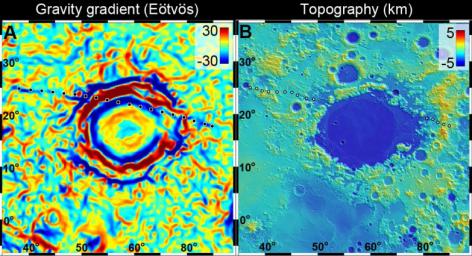
|
Gravity Anomaly Intersects Moon Basin
- Click the image above for a larger view
- Full-Res JPEG (1065 x 578) (167.8 kB)
- Full-Res TIFF (1065 x 578) (1.8 MB)
Caption:
A linear gravity anomaly intersecting the Crisium basin on the nearside of the moon has been revealed by NASA's GRAIL mission. The GRAIL gravity gradient data are shown at left, with the location of the anomaly indicated. Red and blue correspond to stronger gravity gradients. Topography data over the same region from NASA's Lunar Reconnaissance Orbiter's Lunar Orbiter Laser Altimeter are shown at right; these data show no sign of the gravity anomaly.
The anomaly is truncated by the basin, indicating that it is older than the basin and was partially destroyed by the impact.
The units of the gravity gradients are Eotvos, and of the topography are kilometers.
Background Info:
NASA's Jet Propulsion Laboratory in Pasadena, Calif., manages the GRAIL mission for NASA's Science Mission Directorate in Washington. The Massachusetts Institute of Technology, Cambridge, is home to the mission's principal investigator, Maria Zuber. GRAIL is part of the Discovery Program managed at NASA's Marshall Space Flight Center in Huntsville, Ala. Lockheed Martin Space Systems in Denver built the spacecraft. The California Institute of Technology in Pasadena manages JPL for NASA.
For more information about GRAIL, please visit http://grail.nasa.gov .
Cataloging Keywords:
| Name | Value | Additional Values |
|---|---|---|
| Target | Moon | |
| System | Earth | |
| Target Type | Satellite | |
| Mission | GRAIL | Lunar Reconnaissance Orbiter (LRO) |
| Instrument Host | GRAIL | |
| Host Type | ||
| Instrument | ||
| Detector | ||
| Extra Keywords | Color, Impact | |
| Acquisition Date | ||
| Release Date | 2012-12-05 | |
| Date in Caption | ||
| Image Credit | NASA/JPL-Caltech/CSM | |
| Source | photojournal.jpl.nasa.gov/catalog/PIA16582 | |
| Identifier | PIA16582 | |
